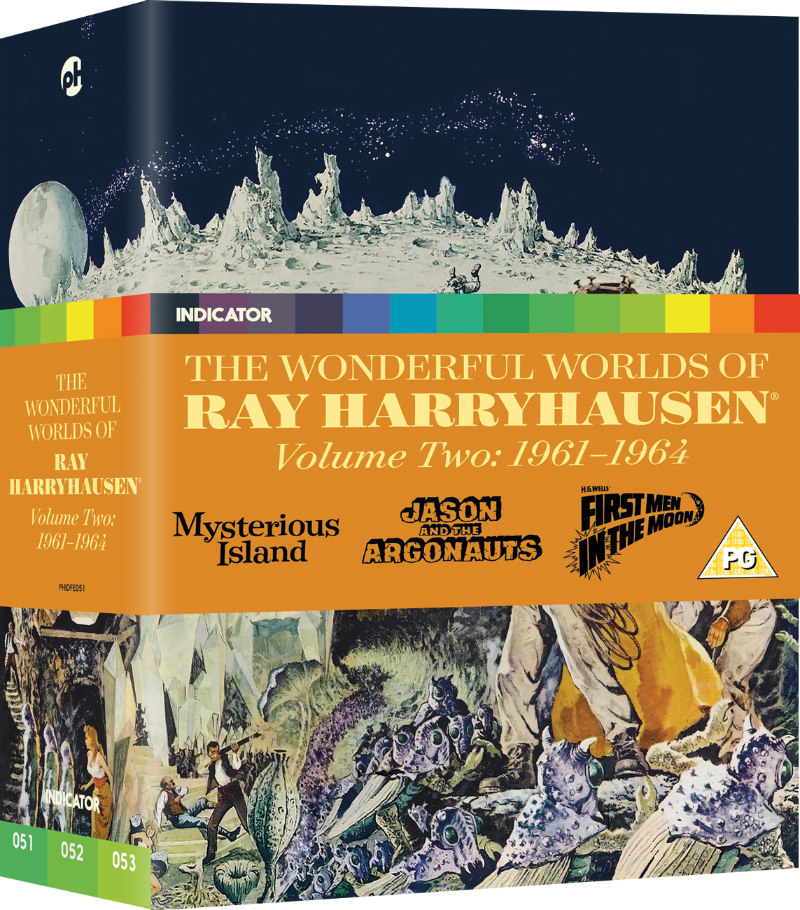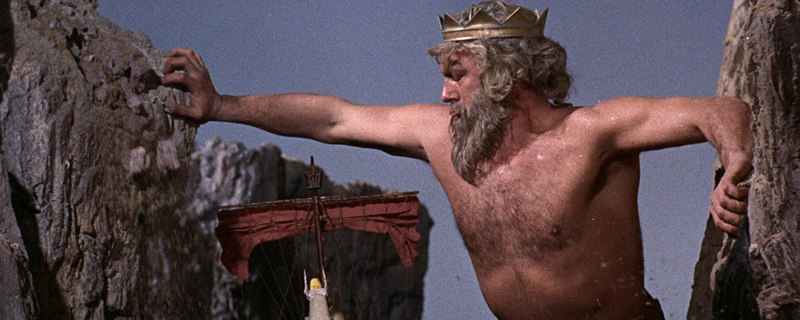
Second set of three movies featuring the work of stop-motion legend Ray Harryhausen.
Review by Jason Abbey

Powerhouse return with their second volume of Ray Harryhausen’s work. If the first set was of variable quality, acting as a showcase for his burgeoning talent, this one brings out the heavy hitters, showcasing his best Sinbad free work.

First up is Mysterious Island, which works as a semi sequel to 20,000 Leagues Under the Sea but is more effective as a boy's own matinee adventure with some stop motion monsters from the Harryhausen menagerie. The direction is taut and the whole thing moves at a fair clip; Cy Enfield is a step up from the usual stable of Dynamation directors. The American Civil War setting (though clearly looking like rural England) gives the characters a little more edge than usual and the prison hot air balloon escape is effectively staged. Why there is a hot air balloon near a prison is a question unanswered, and you feel confederate HR may have something to say about the matter. The escapees are then whisked away to a mysterious island near Fiji, with a woeful disdain for spatial geography that would have left the escapees resorting to aerial cannibalism in real life.
It’s all lightly humorous on the Island, with stop motion battles with Giant Crabs and Jurassic Chickens less a deadly threat and more an impromptu opportunity for a spot of lunch. Enfield also manages to placate any sense of homoerotic urges coming to the fore by having a conveniently shipwrecked Aunt and Niece appear - one to look good in a goat skin mini skirt, the other to tidy the place up a bit (obviously, no one involved in this film was part of the swinging sixties). Joan Greenwood was way too talented to be playing housewife to a load of buffoons but has some amiable badinage with Gary Merrill as a Yankee reporter who is one of the escapees. Surprisingly for a film of this vintage, not only does the one black character in the film, Nugent (Dan Jackson), survive to the end, he is also portrayed as a capable and respected member of the team, with the hijinks and comic relief left to Sgt Pencroft (Percy Herbert).
Inadvertently finding Nemo after gate-crashing the world’s smallest giant bee’s nest, our heroes find a way off the Island before, as things are wont to do in these films, the island explodes when one of those pesky volcanoes goes live.
Herbert Lom makes a less flowery Nemo than James Mason, but in truth he has little to do other than espouse his contradictory peace through violence philosophy. The writers do however manage to shoehorn in creatures not in the book by having Nemo create giant beasts to solve world hunger. Great fun, with a Bernard Herrmann score set to maximum pomp.


Jason and the Argonauts needs no introduction. Safe to say it is the best Greek mythos film to come to the screen. It is also arguably the greatest and most iconic of all the Dynamation creations. Don Chaffey may be the definition of a journeyman director but he knows how to stage a set piece, and with material this rich he can’t lose, be it the justly iconic climatic skeleton battle or the equally iconic Talos, the best showcase of stop motion's jittery qualities married to the heft of the imposing bronze giant. Only Triton fails to impress, being a slightly tubby old guy in a mermaid costume.
A weak link in these films is the bland as beige hero. Todd Armstrong stands out in this respect by extending his range to taupe (although this required over-dubbing by another actor). The Argonauts also make a splendidly ratty bunch, featuring the most dog eared Hercules (Nigel Green) cast in a film and an Argus (Laurence Naismith) who may be a proto naturist, seeing as he spends most of the film exhorting the Argonauts to row faster while clad in a pair of ancient Greek Y-Fronts.
It's a film packed with memorable set pieces from your childhood, be it Patrick Troughton assailed by Harpies or the attack of the seven headed Hydra. It looks spectacular in 4K and moves at a speed that the later bloated Clash of the Titans can only envy. This is the high watermark of Harryhausen’s work and deserves to be seen on the biggest TV screen available.


The less renowned First Men in the Moon is a charmer that still has plenty to offer. Like the earlier The 3 Worlds of Gulliver, this feels less of a showcase for stop motion and more part of the armoury of effects available at the team’s disposal. Harrthausen reunites with director Nathan Juran on an adaptation of HG Wells' novel which manages to shoehorn in a then contemporary prologue with an optimistic US, British and Russian first manned flight to the moon. It also has a script by legendary Quatermass writer Nigel Kneale.
The type of story that would now be termed steam punk, First Men in the Moon features a bumbling inventor, Cavor (Lionel Jeffries), who has invented an anti-gravity substance, and his on the make neighbour Arnold (Edward Judd). That said substance enables them to get to the titular place is self-evident; what is interesting is the ambiguity and characterisation.
Arnold, not to put to fine a point on it, is a bit of a shit. He lies to his fiancée Kate (Martha Hyer) about his debts, fakes the ownership of the house they live in and even implicates her in the fraudulent transference of the house deed to her name. The film portrays him as the hero, but Kneale’s script seems to say otherwise.
This features the best acting in the box set from the always reliable Jeffries, who is very much in his comfort zone as the bumbling Professor, eccentric, charming with a nice line in security geese. Judd is reliable, with the same mixture of smarts and sleaze that he brought to The Day the Earth Caught Fire. Hyer gets something of a thankless role as her partner’s patsy, who inadvertently puts the first chickens in space and brings an Elephant Gun to an insect fight. Requiring little more to do than be captured by insectoid aliens (played by children) or be duped by her fiancée, she does good work with limited development.
Harryhausen is working in a minor key here, with only a very hungry caterpillar and a few of the insectile creatures being produced in stop motion. The space visuals are quiet impressive for a film made before the actual first men on the moon, even if they might need to rethink those deep sea diving suits. The crystalline set design is also something to behold, giving proceedings a slightly trippy ambience.
For all the film's jauntiness there is an air of pessimism once they land on the moon. For all of Cavor’s 'we come in peace' efforts at communication, the overwhelming threat that man has in store for these moon dwellers is starkly apparent when Judd fights them on first meeting and then attempts to kill a leader who doesn’t want them to return home once he learns of the violent nature of life on earth.
Even the epilogue has a certain colonial pomp that ignores the fact they may have inadvertently wiped out a whole species by instigating a flu based genocide. Not quite the best film on the set but certainly the most thoughtful and intelligent, less set piece driven and more nuanced, giving equal weight to both effects and story. This 4K restoration makes it worthy of reassessment by fans of science fiction.

Extras:
As per the first volume, this is an all bells and whistles box set with 4K restorations of Jason and First Men with mono and 5:1 audio options. Harryhausen provides commentaries on all films, which also come with additional talk tracks from film historian Randall William Cook, who also supplies a touching introduction to First Men. As if that isn’t enough you also get hobbit wrangler Peter Jackson performing commentary duties on Jason.
Mysterious Island has interviews with Harryhausen as well as actor Michael Craig and camera assistant Ray Andrew, who both have a dislike of director Enfield. All genial enough, the only controversy seems to be whether the giant crab was sourced from Harrods or Whitstable. Hal Hickel (FX Assistant) also has a short interview. Of most interest is genre expert Kim Newman supplying an erudite overview of the film and its place in the Jules Verne cinematic universe. A comic book sequel is also included as well as archive trailers, archive documentary, isolated score and a Super 8 version.
If anything, Jason and the Argonauts is even more comprehensive with an hour long look at the maestro's work presented by Leonard Nimoy, a feature in which various luminaries of the special effects and film industries discuss the influence of stop motion on their work. John Landis interviews Harryhausen with a stop motion skeleton, and there is also a storyboarded sequence of the climatic boneyard battle.
First Men in the Moon may be a little lighter in extras but still contains interviews with crew members, a Landis trailer commentary, archival featurettes and trailers.
The Wonderful Worlds of Ray Harryhausen: Volume Two (1961-64) is available on blu-ray now from Powerhouse Indicator.

